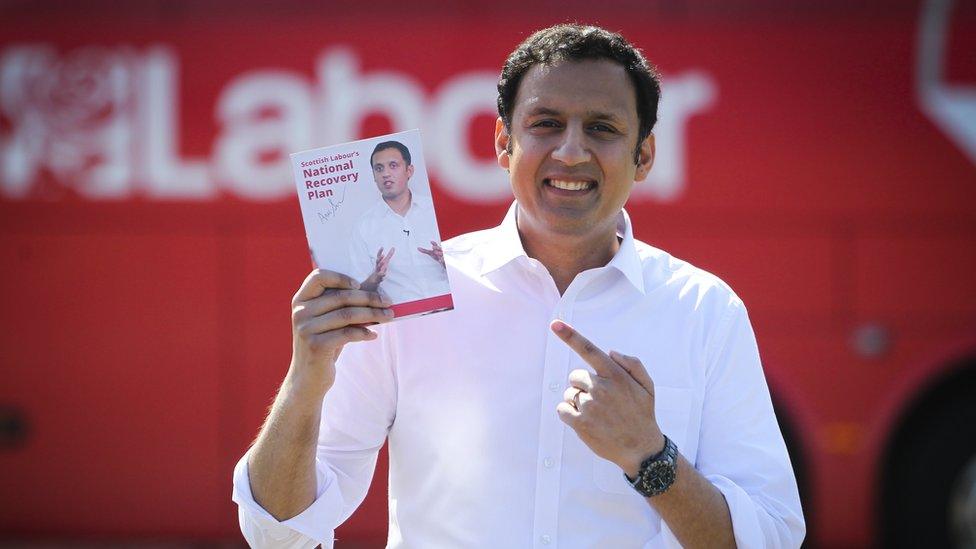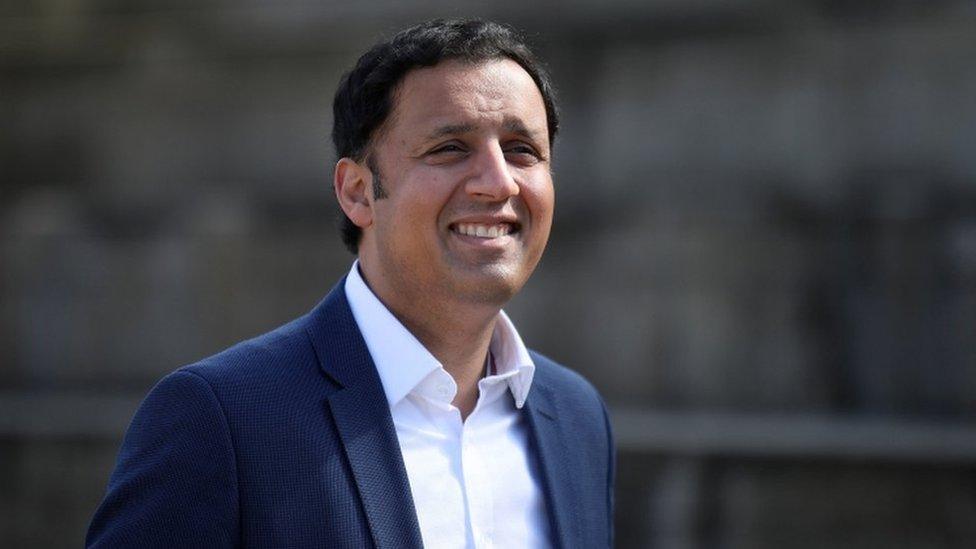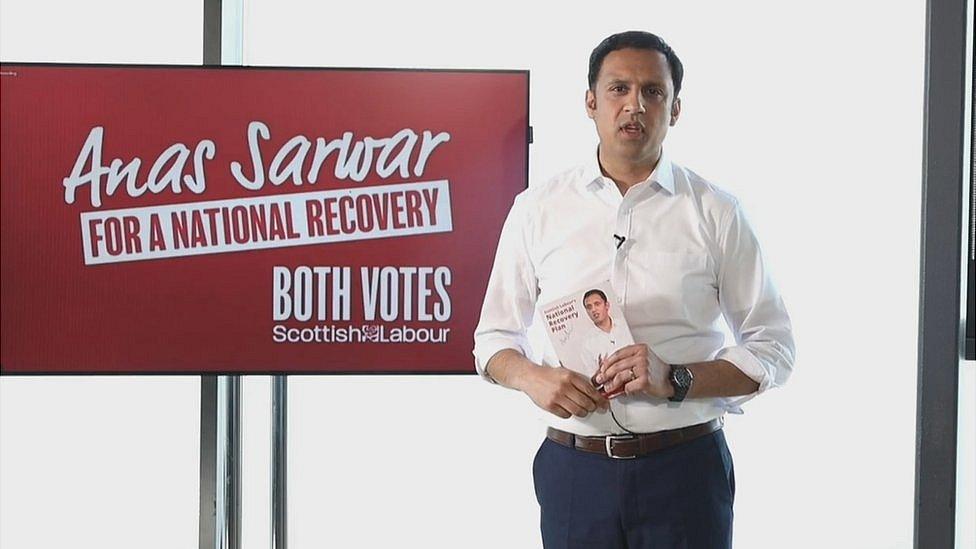Scottish election 2021: Scottish Labour policies explained
- Published

The Scottish Labour Party has launched its 2021 election manifesto. The full document, external runs to 59 pages. So, what is the party promising? BBC Scotland's correspondents have been analysing the pledges.
1. Short and long term economic recovery

Work, re-skilling and the economy take top billing for both short term recovery from Covid and the longer term. There's a big promise of a job for everyone under 25, disabled or long-term unemployed - potentially 60,000 roles. Anas Sarwar is keen to underline that he wants to work with business - on this, and across his economic plans.
That said, business would be put under pressure by Labour to improve employment conditions, adding strings to public sector contracts, and improving women's experience of work - paid and unpaid.
To kickstart spending, there is a £75 voucher for every adult being suggested, and an incentive to pay some of the hotel bill for a staycation. Together, they would cost £436m.
The bill for the recovery programme runs to £4.5bn, a third of that in capital projects. Some would overlap with funds already committed and go further, while Labour hopes there will be enough left over in unallocated money.
While there is no attempt to balance spending aims over five years with funds available to the Scottish government, Anas Sarwar's party wants bigger borrowing powers for Holyrood, using local council borrowing to help its big housing ambition of 200,000 homes over 10 years.
That is one of the aims, alongside 50 hours of state-funded childcare each week and a minimum income guarantee, that stretch beyond the next parliamentary term.
There's no anticipation of changes to income tax, but if more funds are needed, there is a commitment that it would not affect anyone earning below £100,000 per year. Other taxes are suggested, including one on online retail, and another getting polluters to pay.
Past talk of introducing a wealth tax is not in this manifesto. The party wants to reform council tax, instead basing payments on property values and ability to pay. In common with other parties, Labour doesn't say how that would work, preferring to look to an outbreak of cross-party agreement.

SCOTLAND ALERTS: Get extra updates on BBC election coverage

2. Restarting the NHS

Restarting the NHS after the pandemic is top health priority for Scottish Labour, and to do that it plans to prioritise cancer patients.
It says it will spend £9m on things like increasing staff and laboratory capacity to catch up on missed screening appointments and to create rapid diagnostic centres to ensure people don't have to wait for key tests.
£300m is to be spent on addressing the backlog. That will be used to increase elective capacity so each major hospital will have the ability to manage waiting times and increase routine NHS work.
The real challenge here will be finding enough staff to fill the roles. Official figures show 55% of consultant vacancies remain unfilled after six months. Among the specialisms with the highest vacancy rates are radiologists, crucial in cancer diagnosis. Any expansion in medical student places now will take a decade before it translates into fully trained doctors.
3. Personal education comeback plan for every pupil

The needs of young people and the impact the pandemic has had on their education and social lives has been much talked about by Scottish Labour on the campaign trail and today we see the detail of what it proposes as a solution.
A major part of its strategy would be to put in place a "personal comeback plan" for every school pupil.
This would be written up following an individual needs assessment and a mental health check-up.
The party says it would make a personal tutoring programme available to students who would either refer themselves or be put forward by teachers, with resources going first to those who had fallen furthest behind.
The party says it would also offer counselling to young people who need it.
Another key aspect of this plan would be a "summer comeback pass" which would be available to all and focus on free sport, outdoor activities and culture during the school holidays.
4. Double the Scottish Child Payment to £20

Despite legal targets to reduce child poverty in Scotland to 10%, last month's revelation that that trend is going in the wrong direction - with one in four children now classed as in poverty - is having an impact on the election promises being made to families who have found themselves in crisis.
Scottish Labour is the latest party to promise a doubling of the new Scottish Child Payment to £20 a week - a benefit that was only just introduced for under-6s in February and is now broadly recognised as inadequate to stop the impact the pandemic will have on poverty levels.
The party also pledges to accelerate the rollout of the benefit for under-16s - despite concerns over delays in data sharing between the DWP and Social Security Scotland - and offer an additional £5 a week for families with disabled children. There is also a promise to expand free school meals over the summer.
In terms of helping with household bills, Scottish Labour also plans a £100 rebate for all homes due to the £531 million surplus at Scottish Water. A Debt Advice Levy is also mooted, taxing credit firms to fund services that help those with crippling levels of debt.
5. A just transition to net zero

The climate recovery is Scottish Labour's fourth national mission after jobs, health and education. But it's a hefty and detailed part of their manifesto.
Threaded through the environmental pledges are commitments on jobs, jobs, jobs to appeal to their core voters. It stresses the importance a just transition by investing in reskilling so workers don't lose out as industries change. And there's an emphasis on ensuring society's poorest don't become climate victims.
Retrofitting all homes by 2030 to improve energy efficiency will create 7,500 jobs, it says, with a further 19,000 being sustained through building energy efficient council houses.
But the stand out is the party's Scottish Conservation Corps; an army of workers who will help with tree planting and peatland restoration; although the targets for how much they'll achieve are pretty much the same as every other party's.
6. Oppose indyref2 in the next five years

Independence has been an uncomfortable topic for Scottish Labour ever since the 2014 referendum, with the party largely left as a third wheel in a binary debate.
The SNP dominate the pro-independence vote, while the Conservatives have sought to sweep up supporters of the union. Labour have been left asking whether people would rather talk about something else.
From that perspective, little has actually changed in the party's position for this election. Labour still quietly opposes independence, but fundamentally would rather be focused on other issues.
What has changed compared to previous elections is the context of this campaign. In the Covid-19 pandemic and the recovery to come, there is a compelling "something else" to point to.
The constitution will always be a difficult balancing act for a party which has in recent years lost the support of both pro-independence and pro-union voters.
Labour needs to win back support from both ends of the spectrum if it is to stand a chance of regaining its position atop Scottish politics - and this why Anas Sarwar's key mission is to shift the focal point of the debate away from referendums and onto recovery.
7. End 'patchwork' provision of public transport

Labour wants to use the power of the state to transform Scotland's transport system. It pledges to end what it calls a "patchwork" of services, which leaves parts of the country without decent provision.
So there is a plan for a public bus service - meaning an end to the privatised bus network brought in by Margaret Thatcher in the 1980s.
It wants to extend free bus travel to under 25s, with the long-term goal of free bus travel for all.
It would build on the recent ScotRail re-nationalisation too, bringing all of Scotland's railways under public ownership, including the Caledonian Sleeper. Trade unions, it says, would get a seat on the board of the new operator.
There'd be an extension of rail links to transport hubs like airports. And it would look to reopen stations and improve the branch network.
Labour wants to boost spending to help people get out of their cars, onto bikes, footpaths and public transport. It is pledging 10 per cent of the transport budget to bring this about.
There's support too for drivers, with a pledge to abolish the workplace parking levy. There are plans to set up a dedicated pothole fund to pay for road repairs, and a commitment to improve key routes like the A83 at the Rest and Be Thankful, which is regularly closed by landslides.
Labour wants more drivers to use electric cars, so it is committed to interest-free government loans to help those on low and middle incomes buy an electric vehicle. But speed limits would be cut on all restricted roads to 20mph, and low emissions zones would be extended.
Labour's plans to extend public ownership would apply to Scotland's ferry network too, with what it calls "proper investment" in a new fleet of ships. And it is committed to free ferry travel for under 25s.
8. More police officers

Scottish Labour wants to improve the justice system for victims, respond to new crime trends that have emerged during the pandemic, help pay for the sins of Scotland's past and increase protection for police officers and puppies.
The party says it would establish a specialised sexual offences court, develop a gender-based violence strategy and support the abolition of not proven.
Labour would remove the waiver provision from the redress scheme for survivors of child abuse, facilitate "full compensation" for victims of the contaminated blood scandal and pardon Scottish miners "unfairly convicted" during the 1980s strike.
When a 20-year-old man died from a drugs overdose in Livingston in March, his family said he'd quickly fallen back into addiction after serving sentences at Polmont Young Offenders' Institution. Labour says it will ensure that every person leaving prison has a harm reduction plan, with "a safe place to live, registration with a doctor and adequate financial support".
The party wants 500 more police officers in local divisions and a new fleet of ultra-low emission police vehicles, removing the danger of officers suffering from carbon monoxide poisoning.
Legal aid would be reformed and the Lord Advocate would lose his or her dual role as head of Scotland's prosecution service and the Scottish government's chief legal adviser.
On pandemic-related crime, Labour says it will ban the importation of very young puppies and develop a new strategy to prevent online and telephone fraud.

POLICIES: Who should I vote for?
CANDIDATES: Who can I vote for in my area?
PODLITICAL: Updates from the campaign



Do you have a question about the Scottish Parliament election? Use the form below to send us your questions and we could be in touch.
In some cases your question will be published, displaying your name, and location as you provide it, unless you state otherwise. Your contact details will never be published. Please ensure you have read the terms and conditions.
If you are reading this page on the BBC News app, you will need to visit the mobile version of the BBC website to submit your question on this topic.

- Published22 April 2021

- Published22 April 2021
